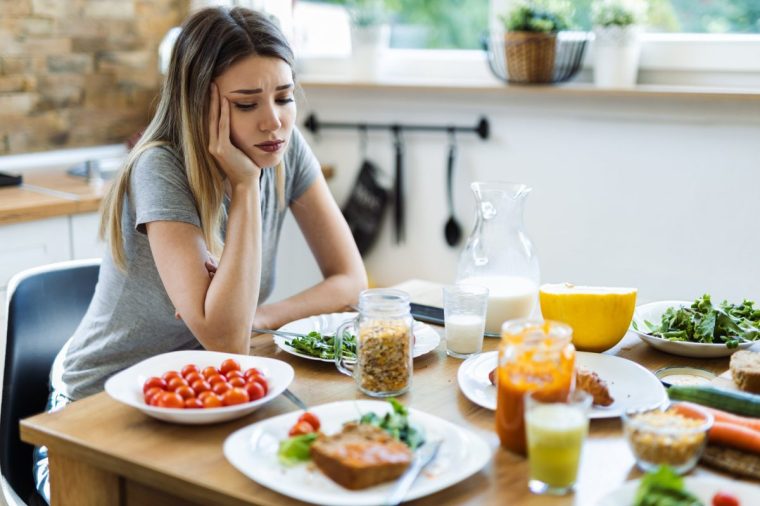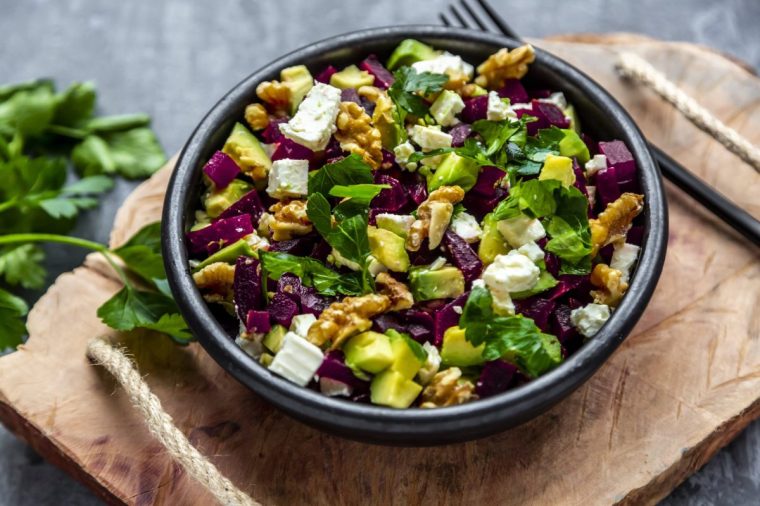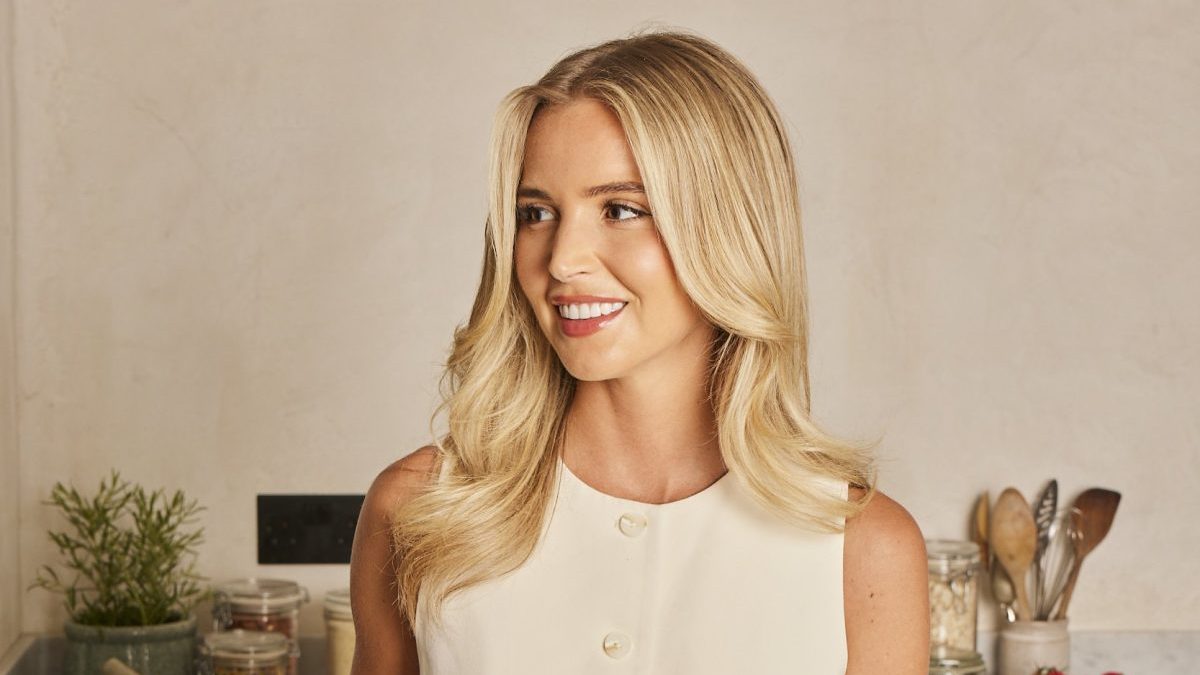A healthy diet needn’t be a restrictive one. Emily English shares the deceptively simple ways she eats well without compromising on the joy of food
“If there are two types of people, those who eat to live and those who live to eat, I’m firmly the latter. Far from seeing food as just some sustenance, I wake up excited for breakfast, and before I’ve finished it I’m already thinking about lunch. I treat dinner like an event. Food is a joy for me and I care deeply about the simple pleasure of eating well.
For too long, though, the wellness and nutrition world has made people feel like loving food and caring for your health are incompatible. That you can either “eat clean” or you give in to indulgence. But it is not true: you can do both. You can eat with love and intention. You can find food that loves your body back.
I know all this because my own relationship with food hasn’t always been healthy. As a teenager, I was scouted at a music festival to be a model. At the time, I was more into biology and chemistry than fashion, but the opportunity was exciting – and I had a great run, especially working with ASOS during its peak. Modelling gave me freedom. I was traveling, earning my own money, eating at incredible restaurants. For a while, it was thrilling.
But then came the critiques. I remember being told that my thighs were “too big” for shoots. I went home and Googled how to lose weight. That was the moment I entered the dark side of wellness: the keto-this, gluten-free-that, goji berry-everything era. Instagram was filled with “clean eating” trends that looked healthy but were deeply rooted in restriction. And with no real nutritional education behind me, I followed it blindly.
I had never seen my family diet. My mum had never said anything about calories or food rules. So when I found myself refusing to eat a homemade cheese roll with my siblings, it was a wake-up call. I remember that moment so vividly- looking at that tiny brown roll with a bit of cheese and tomato and realising how far I’d gone. I wasn’t eating with my family anymore. I was obsessed with food, but in the most damaging way possible.
 it is important to have a healthy relationship wit food (Photo: Goran13/Getty/iStockphoto/Goran Biberdzic)
it is important to have a healthy relationship wit food (Photo: Goran13/Getty/iStockphoto/Goran Biberdzic)
Eventually, I left the modelling industry and pivoted entirely. I enrolled in university at King’s College London and studied nutrition – real, evidence-based, science-backed nutrition. I wanted to understand food not as punishment or control, but as nourishment. It was a decision that changed everything.
Now, as a nutritionist and cookbook author, I see people all the time who have been burned by diet culture. I want them to be able to reconnect with food in a way that feels joyful and sustainable, and my biggest philosophy is that there is no such thing as a perfect diet. There’s only the right one for you.
The best place to start is by asking yourself: how does this food make me feel? Forget the scales and calorie counting. Do you wake up energised? Can you move through your day feeling strong, alert, and calm? For example, I know that I need a big, protein-rich breakfast to feel human in the morning, whereas my mum feels great with oats, honey, and whole milk. The point is that it is personal.
The other important lesson is this: if you want to make changes that last, ask yourself if you can do them forever. That sounds big, but it’s actually freeing. Because if the answer is no, then the change isn’t right for you. So many people come to me with fixed ideas about what “eating healthy” looks like: sad salads, expensive powders, endless meal plans that aren’t sustainable in the long run. But no one thrives in a cycle of “perfect” for three weeks and burnout by week four. Real success looks like eating in a way that’s flexible, sustainable, and most importantly, realistic.
Rather than being about overhaul, it’s about evolution. If you love sandwiches, keep the sandwich. Just ask: can I boost the protein and fibre? Could I add a homemade protein mix or a side of crunchy veggies? If you’re cooking a traditional family recipe, honour it, but maybe swap out one ingredient or introduce a few more colourful vegetables. You don’t need to erase your food to eat well. You just need to build on it.
There are so many small, doable changes we can all make: things like adding passion fruit seeds to a dish for a fibre boost (they pack around 10g per serving, which is amazing), using high-protein yogurt as a salad dressing base, or just choosing brown bread over white.
These are simple swaps that make a real impact without feeling restrictive or joyless.
I personally build my meals around protein, fibre, and diversity – not because it’s trendy, but because that combination keeps me full, satisfied, and energised. When you eat like that, you don’t find yourself crashing at 3PM or raiding the snack cupboard. Protein also doesn’t need to come from grilled chicken and boiled eggs. It can be feta on your salad, a sprinkle of seeds, or a scoop of beans.
 Add ingredients like feta to your salad for a protein hit (Photo: Westend61/Getty/Westend61/Sandra Roesch)
Add ingredients like feta to your salad for a protein hit (Photo: Westend61/Getty/Westend61/Sandra Roesch)
The one thing I do avoid is sugary drinks. Not because I believe in banning foods, but because they truly offer nothing in return – no nutrients, and for me, no satisfaction. I always think: if you couldn’t sit down and eat four apples, why would you drink the sugar equivalent?
But I’d never tell someone to cut everything out. Nutrition is about adding more of what makes you feel good. And above all else, it’s about listening to yourself again. We’ve become so used to letting influencers and algorithms tell us what’s healthy that we’ve forgotten how to check in with our own bodies.
So I will never offer a miracle meal plan or rave about a so-called detox. Instead, I will keep talking about what the focus should be on: consistency, joy, and confidence in your own choices, because that is what lasting health actually looks like.”
As told to Anna Bonet
Live to Eat by Emily English is published by Seven Dials, £25
